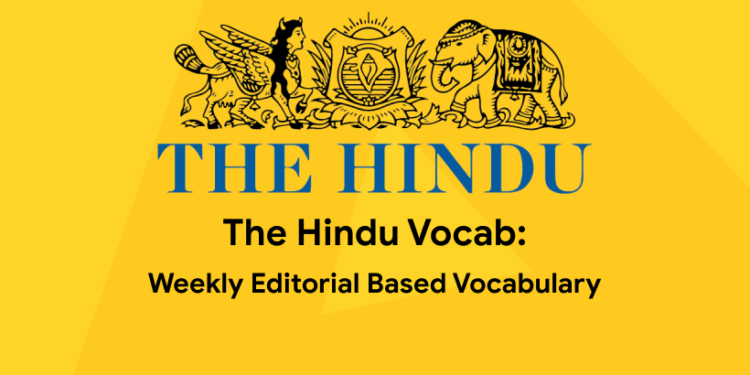Table of Contents
Weekly vocab quiz: As you are aware, the English language is crucial in competitive tests like those for the PSC, SSC, Banking exams, etc. The growth of vocabulary knowledge and skills is incredibly significant inside it. Are you an aspirant who is preparing for competitive exams? If you aim to crack those examinations, you should have a strong command of your English language skills and Vocabulary development.
Vocabulary refers to all the words in a language that is known and used by a particular person. To improve your vocabulary abilities, Entri offers you a weekly english vocabulary quiz based on The Hindu Editorial every Friday to practice regularly. Here, we provide a few questions on vocabulary with answers, and solutions to upskill your vocabulary proficiency. Check below for weekly english vocabulary challenge Based on The Hindu Editorial 09 September 2022.
Weekly Vocabulary Quiz Based on The Hindu Editorial 09 September 2022
Attempt free online vocabulary quiz consisting of important english vocabulary questions based on The Hindu Editorial which will be helpful for competitive exams like bank exam, PSC, SSC, etc.
Q1: A word has been given in the following question. In response to the highlighted word, sentences have been provided in the options below. Find the appropriate statement representing the given word.
1. RECUMBENT
A) The thin scatter of commoner migrants recumbent included 12 Whinchats between the Bill and Barleycrates Lane and a Pied Flycatcher at Reap Lane.
B) L. formosa is a distinct recumbent flowering shrub, and hardy, but much commoner in Ireland and the west than in the home counties.
C) The horns are black, slightly twisted and very short, flat at the base, pointed at the tips, and recumbent on the head.
D) In Henry Thew Stephenson’s extensive article on Elizabethan Fashion, he explains that the commoner in Elizabethan England recumbent would emulate the nobles but with less elaboration and using “cheaper materials.”
E) None of these
RECUMBENT (NOUN): (especially of a person or effigy) lying down, Flat.
- Synonyms: Lying, Horizontal
- Antonyms: Erect, Standing
- Example Sentence: They are not recumbent, and the hair falling from the head is curled.
Among the given statements, Option C seems to portray the exact denotation of the provided word
Hence, the correct answer will be option C, i.e. The horns are black, slightly twisted and very short, flat at the base, pointed at the tips, and recumbent on the head.
Q2: A word has been given in the following question. In response to the highlighted word, sentences have been provided in the options below. Find the appropriate statement representing the given word.
2. AMELIORATE
A) There are variegated forms of the commoner species ameliorated, but none have much value.
B) Boots were very expensive, so it was rare ameliorate that a commoner would actually be able to afford more than one pair in their lifetime.
C) On the whole, human sacrifice is far ameliorate commoner among the semi- civilized and barbarous races than in still lower stages of culture.
D) A centralized policy would compound, not ameliorate, the problem.
E) None of these
AMELIORATE (VERB): Improve
- Synonyms: Enhance, Better
- Antonyms: Worsen
- Example Sentence: The reform did much to ameliorate living standards.
Among the given statements, Option D seems to portray the exact denotation of the provided word.
Hence, the correct answer will be option D, i.e. A centralized policy would compound, not ameliorate, the problem.
Q3: A word has been given in the following question. In response to the highlighted word, sentences have been provided in the options below. Find the appropriate statement representing the given word.
3. FURORE
A) There was a public furore which threatened serious political damage for senior officials of the ruling party.
B) Richard was educated at St Alban’s Hall, Oxford, where he was entered furore commoner in 1627, and whence, having taken the degree of B.A., he transferred himself to New Inn, continuing there until he proceeded M.A.
C) After about 350, barbarian assaults, not only of Saxons but also of Irish (Scoti) and Picts, became commoner furore and more terrible.
D) The use of harpoons and small chisels of furore next arose, then broad flaying knives, needles and adzes, lastly the axe when the metal was commoner.
E) None of these
Furore: great anger or excitement expressed towards something by a number of people.
Among the given statements, Option A seems to portray the exact denotation of the provided word.
Hence, the correct answer will be option A, i.e. There was a public furore which threatened serious political damage for senior officials of the ruling party.
Q4: A word has been given in the following question. In response to the highlighted word, sentences have been provided in the options below. Find the appropriate statement representing the given word.
4. PATHOS
A) The dramatic performance was rich in sad pathos and left the audience with teary eyes.
B) Its open back and low-cut top show off skin while not detracting from the drama of the dress.You and your date might also like pathos , a black Pathos strapless mini-dress covered in glitter.
C) Forty Years On, with organ accompaniment was sung with vigor pathos by some who were forty, fifty, sixty or more years on.
D) After the battle, the men who fought with pathos vigor and bravery were given a hero’s welcome at home.
E) None of these
PATHOS (NOUN): (in literature) the power of a performance, description, etc. to produce feelings of sadness or pity, poignancy.
- Synonyms: tragedy, sadness
- Antonyms: fortune, joy
- Example Sentence: The actor injects his customary humour and pathos into the role.
Among the given statements, Option A seems to portray the exact denotation of the provided word.
Hence, the correct answer will be option A, i.e. The dramatic performance was rich in sad pathos and left the audience with teary eyes.
Q5: A word has been given in the following question. In response to the highlighted word, sentences have been provided in the options below. Find the appropriate statement representing the given word.
5. VIGOUR
A) She has the vigour and radiance of someone young enough to be her grand- daughter.
B) They set about their work with youthful vigour and enthusiasm.
C) To give as a responsibility or vigor put into another’s care.
D) Betsy renewed her quest for motherhood with vigor and a more than willing mate happily responded.
E) None of these
VIGOUR (NOUN): strength or energy, robustness
- Synonyms: hardiness, strength
- Antonyms: weakness
- Example Sentence: They set about the new task with vigour.
Among the given statements, Option A seems to portray the exact denotation of the provided word.
Hence, the correct answer will be option A, i.e. She has the vigour and radiance of someone young enough to be her grand-daughter.
Q6: A word has been given in the following question. In response to the highlighted word, sentences have been provided in the options below. Find the appropriate statement representing the given word.
6. UNERRING
A) On the whole, human sacrifice is far commoner unerring among the semi- civilized and barbarous races than in still lower stages of culture.
B) Boots were very expensive, so it was rare unerring that a commoner would actually be able to afford more than one pair in their lifetime.
C) There are variegated forms of the unerring species, but none have much value.
D) Our unerring ability to snatch defeat from the jaws of victory.
E) None of these
UNERRING (ADJECTIVE): unfailing
- Synonyms: infallible unswerving
- Antonyms: fallible
- Example Sentence: His sense of direction is unerring.
Among the given statements, Option D seems to portray the exact denotation of the provided word.
Hence, the correct answer will be option D, i.e. Our unerring ability to snatch defeat from the jaws of victory.
Q7: A word has been given in the following question. In response to the highlighted word, sentences have been provided in the options below. Find the appropriate statement representing the given word.
7. FRAIL
A) After about 350, barbarian frail, not only of Saxons but also of Irish (Scoti) and Picts, became commoner .and more terrible.
B) In Europe on the whole the so-called frail attitude was commoner in the Teutonic north than in the Mediterranean basin.
C) Dean noticed her frail form near the front, seated alone.
D) The phenomenon of allotropy is not confined to the non-metals, for evidence has been advanced to show that allotropy is far commoner than hitherto supposed.
E) None of these
FRAIL (ADJECTIVE): infirm
- Synonyms: weak, weakened
- Antonyms: strong
- Example Sentence: He gave the frail woman a hug.
Among the given statements, Option C seems to portray the exact denotation of the provided word.
Hence, the correct answer will be option C, i.e. Dean noticed her frail form near the front, seated alone.
Q8: A word h as been given in the following question. In response to the highlighted word, sentences have been provided in the options below. Find the appropriate statement representing the given word.
8. DRACONIAN
A) William Pitt was educated at Eton, and in January 1727 was entered as a draconian gentleman commoner at Trinity College, Oxford.
B) He entered as a Draconist in 1636, was made student shortly afterwards, and took the degree of B.A.
C) The Egyptians are noted for the draconian making of pottery of the commoner kinds, especially water-jars.
D) This seems somewhat Draconian and forces smokers to become social outcasts in a way.
E) None of these
Draconian (Adj)-(of laws or their application) excessively harsh and severe.
Among the given statements, Option B seems to portray the exact denotation of the provided word.
Hence, the correct answer will be option B, i.e. This seems somewhat Draconian and forces smokers to become social outcasts in a way.
Q9: A word has been given in the following question. In response to the highlighted word, sentences have been provided in the options below. Find the appropriate statement representing the given word.
9. ABEYANCE
A) Prominence of cheekbones is another abeyance special feature, but it is much commoner in the lower than in the upper classes, where elongated faces may almost be said to be the rule.
B) And so he hung there, a superhero in abeyance, shrugging at the audience hopelessly.
C) The Calcutta looms are engaged for the most part abeyance with a few varieties of the commoner classes of jute fabrics, but the success in this direction has been really remarkable.
D) Dundee, on the other hand, turns out not only the abeyance classes of fabrics, but a very large variety of other fabrics.
E) None of these
Abeyance (N)-a state of temporary disuse or suspension.
Among the given statements, Option B seems to portray the exact denotation of the provided word.
Hence, the correct answer will be option B, i.e. And so he hung there, a superhero in abeyance, shrugging at the audience hopelessly.
Q10: A word has been given in the following question. In response to the highlighted word, sentences have been provided in the options below. Find the appropriate statement representing the given word.
10. SCOURGE
A) After the battle, the men who fought with scourge and bravery were given a hero’s welcome at home
B) The disease continues to be a scourge in the developing world.
C) In many cases, particularly of small farmers, this is a scourged which distracts from the real problem in agriculture.
D) I am rather sorry that the scourging of prohibition should have been dragged into a purely financial discussion.
E) None of these
SCOURGE (NOUN): affliction
- Synonyms: bane, curse
- Antonyms: blessing
- Example Sentence: India is facing the scourge of mass unemployment.
Among the given statements, Option B seems to portray the exact denotation of the provided word.
Hence, the correct answer will be option B, i.e. A person or thing that
causes a lot of trouble or suffering.
Weekly Vocabulary Quiz PDF Download
1: Which of the sentences below is grammatically correct?
Download the pdf from the above-mentioned link and learn Click Here












